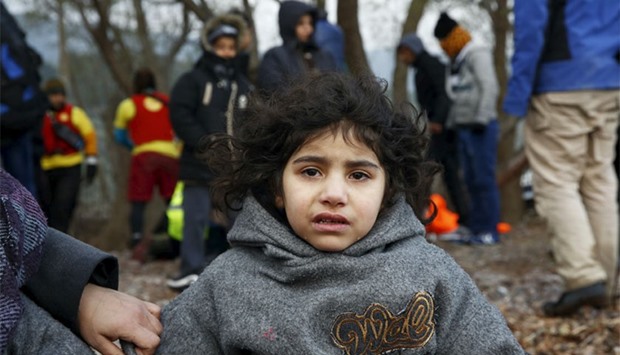Despite wintry conditions, thousands of people fleeing war and misery are still embarking on the dangerous journey across the Mediterranean to seek a better life in Europe.
In a stark illustration of the high cost of the voyage, Greek and Turkish coastguards recovered the bodies of 44 migrants -- including 20 children -- whose boats capsized on their way to Greece, officials said Friday.
Greek rescuers pulled 74 people to safety after two boats ran into trouble off the Aegean islands of Farmakonisi and Kalolimnos in the early hours. But the toll could rise as rescuers were still scouring the waters for people missing from the boat that capsized off Kalolimnos.
Of the survivors, "most are in a state of shock. There were families on board and in some cases only the father survived," UNCHR official Marco Procaccini told AFP.
Charity Doctors without Borders, which is providing psychological care to survivors of the Kalolimnos shipwreck, described the horror on its Twitter account, saying "one man lost his pregnant wife and two kids, a 17-year-old lost his brother, an entire family was swallowed by the sea".
Separately, the Turkish coastguard found the bodies of three children on Friday after a third boat sank near the seaside resort of Didim, the Dogan news agency reported.
Europe has been battling to resolve its biggest migration crisis since World War II, but member states are split on what action needs to be taken even as the number of people killed trying to get to the continent rises.
Latest confirmed figures from the International Organisation for Migration put the death toll for January at 113, a figure that includes only 15 of the latest 44 fatalities.
"These deaths highlight both the heartlessness and the futility of the growing chorus demanding greater restrictions on refugee access to Europe," said John Dalhuisen, Amnesty International's Europe and Central Asia Programme Director.
'Not asking for money'
Germany and Turkey have emerged as crucial players in the crisis, and Merkel, who hosted Prime Minister Ahmet Davutoglu for talks, said both sides signed an agreement to "do everything to reduce the number of refugees" crossing into the EU.
In exchange, Ankara can count on German support in easing by October EU visa requirements for Turkish citizens visiting the Schengen area.
Merkel also won praise from Davutoglu for her leadership in the refugee crisis, who said: "Mrs Merkel has taken a historic step in the conscience of humanity."
Merkel has so far resisted demands for a refugee quota, after nearly 1.1 million asylum seekers arrived in Germany in 2015.
She has instead promised a "tangible reduction" in new arrivals, and is counting on international efforts to deliver.
The German leader secured some backing from US President Barack Obama, who in a phone call late Thursday pledged to contribute "substantially" at a Syria donors' conference in February.
At the Davos summit of business and political elite, US Secretary of State John Kerry also made a call for a 30-percent hike in international aid for refugees.
But Merkel is well aware of the pivotal role played by Turkey, which not only shares a border with war-torn Syria but is also a launchpad for thousands of migrants.
Under a November deal with the EU, Ankara had already agreed to reduce the number of migrants coming through, but between 2,000 and 3,000 people are still arriving daily in Greece from Turkey.
At the same time, the EU has yet to deliver on the deal either, with member states still squabbling over the financing for aid towards the 2.2 million Syrian refugees that Turkey is hosting.
Press freedom, Kurds
Turkey has a special relationship with Germany as the EU's biggest economy is not only home to around three million people with Turkish roots, but is also its biggest trading partner.
Merkel said she raised thorny topics with Davutoglu such as media independence and the situation of the Kurds, but she said these issues were "very strongly outweighed" by common concerns including the refugee crisis and the battle against the IS.
Worries over press freedom are rising in Turkey, after an increasing number of journalists were arrested for insulting or criticising top officials.
US Vice President Joe Biden, on a visit to Istanbul, strongly criticised Turkey for failing to set the right "example" on freedom of expression.
Turkey is also waging an all-out offensive against the separatist Kurdistan Workers' Party (PKK), with military operations backed by curfews aimed at flushing out rebels from several southeastern urban centres.
But Kurdish activists say dozens of civilians have died as a result of excessive force.

